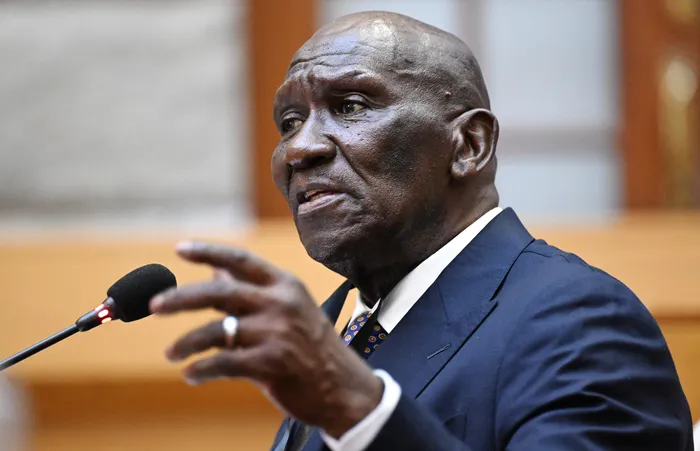
Former police minister Bheki Cele giving evidence on his second day of testimony at the parliamentary inquiry probing allegations of corruption and interference in the criminal justice system.
Image: Phando Jikelo / Parliament of RSA
The closure of the Cato Manor organised crime unit more than a decade ago was a catastrophic mistake for the province and has crippled its ability to contain violent crimes.
That is the view shared by former police minister General Bheki Cele and those that were at the heart of leading the unit.
Cele and Major General Johan Booysen spoke about the work of the unit as the country buckles under the strain of violent crimes and the allegations that senior police officers are colluding with criminals to subvert the rule of law.
The unit, known as the “Cato Manor Unit”, was headed by Major General Booysen. It has been reported that the members of the unit found themselves arrested and in the dock several times over the years, facing serious charges including racketeering.
The unit later came under public attack with false reports alleging it was a “kill squad”; the reports were later retracted after having been found to be untrue.
Following their arrest and the disbandment of their unit, some of the members have taken legal action against the government and filed claims amounting to millions of rand on account of how they were treated by the state.
The unit is credited with dealing decisively with violent crimes, including in the taxi industry.
Talk around the work of the unit has re-emerged again after the former police commissioner and minister Cele sang high praise for the unit while appearing before the Ad Hoc committee.
The committee is investigating allegations that politicians and senior police officers are colluding with criminals,
The unit was among the most feared in South Africa for how it dealt with crime, to the extent that running jokes circulated that if this unit was looking for you, you were better off handing yourself over to the police.
Cele told the members of the committee that while the organised crime unit was operating, it had essentially crushed violent crimes. “Cash-in-transit heists in KwaZulu-Natal were zero because of the work of that unit,” he said.
Cele stated that the "damaging" of police management internally by others, including the former police commissioner Riah Phiyega and police minister Nathi Mthethwa, had resulted in uncontrollable levels of crime.
When asked why the unit was closed down, Cele said: “Ask KwaZulu-Natal Commissioner Nhlanhla Mkhwanazi, he is still there. The former minister Mthethwa, God rest his soul, and his president (Jacob Zuma was the president of the country at the time) had a habit of ‘reversing things,” he said, highlighting that in certain years before Phiyega took over, crime was under firm control in the country.
He noted that after Phiyega took over and started making changes inside the management and police unit, got rid of som units, crime got out of control. “You can see ( after she made changes), crime went up like a Concorde ( airplane), it been high to this day,” Cele said.
In a statement, Booysen said the unit was one of the best the country has ever had, and shuttering it has been devastating to province and the country.
He said the Cato Manor Unit was closed in 2012 through political interference, after misinformation was planted in a newspaper by nefarious players in the police's Crime Intelligence Unit. At the time of its closure, it was one of the most successful units in the country.
“Before they were unceremoniously shut down, they managed to bring cash-in-transit heists and ATM bombings down to almost zero. They had a major impact in addressing violent crime in KZN such as vehicle jackings, police killings, and taxi-related murders. The previous minister of police Bheki Cele confirmed as much during a recent sitting of the ad hoc committee in parliament. I agree with the erstwhile minister that it was a 'disaster' to close Cato Manor,” said the former police commander.
He stated that years of institutional knowledge and informer networks, which took years to establish, were lost. “Not surprisingly, crime spiked as a result. The tenure of Riah Phiyega as police national commissioner and later the disastrous appointment of Berning Ntlemeza as the Hawks' head particularly caused immeasurable harm to the police organisation. The police are presently in an existential crisis,” he stated.
General Booysen said drastic intervention and political will are needed to avoid a complete implosion of the organisation. “There is no time to experiment. Strong and decisive leadership is required to salvage the police as an organisation,” he concluded.
Cape Times